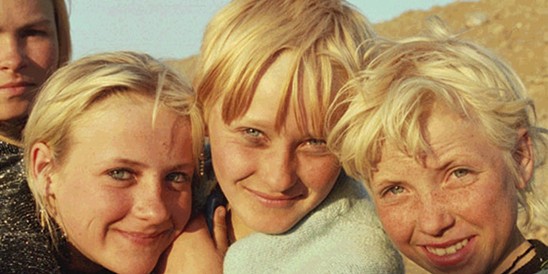
Different young programmers initiatives are popping up in cinemas around the country. They’re an opportunity for cinemas to learn from young people, and young people to learn about cinemas, for everyone’s benefit. Over the weekend of 18/19 March, the Barbican in London will be presenting Chronic Youth 2017, a season of six screenings produced by the Barbican Young Programmers group. Here, two of its twelve members give us their take on the process of programming and marketing.
Ross McDonnell
Among the busy culture of film clubs and collectives exists Barbican’s Young Programmers, a group of fifteen who are entrusted to curate an annual film festival. The group has existed since 2012 with different members joining each year. The title Chronic Youth carries over from last year’s programme. Coming-of-age films can be a difficult genre: so popular and so familiar, but regularly producing films too schematic or sterile.
The Young Programmers initiative is a great opportunity for us and the Barbican: the cinema team here gets first-hand insight into how we engage with cinema and receive film. In particular the challenges of dwindling nationwide average occupancy rate,multiple means of viewing, the huge number of films released theatrically per week and the incredible competition there is for young peoples attention.
For us, we get the opportunity to meet experienced curators, distributors and producers and are free to programme what we think people would want to watch to perhaps project things we’ve only ever seen broadcast on TV or bootlegged on a laptop, or, now, on the other side of that eye-opening loss-of innocence, try and do something small toward changing how much important filmmaking sadly still goes without distribution. Our programme is finalised, we have successfully curated a film festival, and after six months what have we learned?
Our job was not to type coming-of-age into Wikipedia, and copy and paste what we found, but to create more inspired choices that renders the programmer not just paper-pusher or rule-follower. Instead, ideally, we hoped to pick films and filmmakers that refuse formula.

Programming could be pure idealism, an impulse to turn fantasy into reality. But in reality an idea can create challenge upon challenge as it gets closer to materialising, and only eventually might it ever amount to anything. Practical realities and unavoidable logistics threaten you at every corner newly turned, hope is always commensurate with disappointment, the magical with the miserable. Why volunteer for this dangerous idea that encourages delusion and daydream? You are not going to chase your favourite filmmaker to the airport and beg them to stay, and they are not going to give you their jacket as a souvenir to remember them by. Some very worthy films had to be set aside.
In our rookie attempt at putting together a programme, we learned about the machine of International Sales and Distribution; about strange-sounding things like Scalarama? and Pascale Ramonda?; about the difference between championing a film and feeling dangerously kindred with one,a semi-selfish one-to-one connection that binds you with invisible and inextricable heartstrings.
Through the ego-threatening process of pitching our programming suggestions to the group, with space to deal with rejection and a time window to move on or bounce back, we recognised our true diversity of taste. It toughened up this group of burgeoning young professionals.
In our programming, we were ultimately (soberly) at the mercy of what is available, what is still out there in circulation, within reach,preserved. Following a something old, something new, something borrowed,something blue approach, this is what we decided on:

The programme
French film Swagger(making its UK premiere) and the Danish-Polish Something Better to Come are two most different documentaries: the former candy-coloured and kinetic, capturing the energy of its subject with a titular swagger; the latter a 14-year chronicle of the children living on Russias biggest garbage dump, a community struggling to survive in such adverse conditions.
Our shorts programme NewVoices of Girlhood showcases five emerging female filmmakers, national and international, while 1916 silent film Shoes the social issues it depicts still relevant today is from one of the first women filmmakers: the pioneer Lois Weber.
Romy + Micheles HighSchool Reunion is a comedy both beloved and underrated, something even ahead-of-its-time when we consider how female friendships and platonic relationships are still too-rarely represented on-screen. Millennium Mambo then, is both a film by Taiwanese master Hou Hsiao-hsien and a film that can be excitingly contextualised and programmed outside of a Hou Hsiao-hsien retrospective. With an ambivalent chronology and minimal plot, Millennium Mambo could be film at its most existential, transferring instead a feeling of loneliness and alienation, its hedonism and melancholy just code for drug use and depression. In its twin existence – both material and immaterial – it neatly reflects the work and weight of programming and projection the shipping of prints, the assembling of reels all done for the sake of 105 minutes of flickering light. Millennium Mambo will be preceded by two short films (never shown before in the UK) by one of the most acclaimed working filmmakers: Mia Hansen-Love. As well as the apparent similarities between Hou and Hansen-Loves work, and Hansen-Loves own radical approach to the coming-of-age genre, these debut shorts made in the filmmakers early twenties highlight a brilliant filmmakers more modest,experimental beginning.
With some films moved to larger screens and some nearly sold out, were very happy with what the group has achieved.

Will Webb
Throughout the weeks, we’ve been lucky to have heard from a selection of guest speakers who have various skills and knowledge in the many points in the film programming process – distributors, exhibitors, cinema and festival programmers, marketers and even several filmmakers. With members of our group itself having our own diverse set of interests, and different routes into programming, having different experts providing their advice and input reflected our own different interests nicely.
One insight that stands out for me has been into the marketing of festivals. Although some of us have run screenings before, this festival is a massive logistical step-up, and we’ve had great support from the Barbican marketing team. The diversity of our programme brings its own challenges, as were showing six very different programmes that each appeal to different slices of the Barbican audience, so we’ve been working hard to make sure we reach each respective audience through standard channels like print flyers and social media. Of course, as the final deadlines for marketing have been approaching, we’ve also been having the standard last minute shuffles and near-misses with confirming our screenings, so its been very hectic. This has been one part of the process where being in such a large and diverse group of programmers has really helped with many different people involved, we’ve been able to spread the work and move at a fast pace in the final weeks before the festival.
See the full line up of the Chronic Youth Film Festival programme here. If you would like to find out how to become a Barbican Young Programmer visit: http://www.barbican.org.uk/education/young-people applications will open in June. For other opportunities for young people at the Barbican see http://www.barbican.org.uk/education/young-people.If you are interested in setting up your own young programmers initiative, the BFI Film Audience Network is running a scheme to develop them. Sign up to hear more by emailing ypn@broadway.org.uk.

